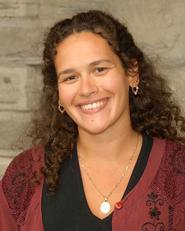
Assistant Professor of Comparative Literature Anjela Cannarelli Peck attended the Middle Eastern Studies Association's annual meeting in Washington, D.C., from Dec. 1-4, where she participated in the panel "Sufism and the Occult Sciences." Her paper was titled “Morisco Mysticism and Magic: The 16th Century Leaden Texts of Granada, Spain.”
In this essay, Peck talked about magic and mysticism as a means to ecumenical harmony among Muslims and Christians in early modern Spain. More specifically, in the decades prior to Spain’s expulsion of the Moriscos (those remaining Andalusi Muslims who, in the 1500s, were forced to convert to Christianity or leave the kingdoms), the anonymous Morisco-authored Libros plúmbeos (Leaden Texts) emerged in and around Granada’s sacred hill, Sacromonte from 1588-1599. When the plúmbeos are read through the language and imagery of Islamic magic and Sufism—practiced in Spain and throughout the medieval Mediterranean basin—their objectives are clarified; they are not only meant to resolve the very real problem of Spain’s divided Morisco and Old Christian communities, but they seek to re-define all individuals as subjects bound to a higher power unshackled to nationalistic boundaries or even strictly defined behaviors and attitudes associated with orthodox Christianity or even orthodox Islam.
Peck argued that through the power of the occult sciences and Sufism, the anonymous Morisco authors of the plomos proposed to unify Muslims and Christians in Spain and beyond through a more inclusive magical and mystical practices and beliefs. This subjectivity would serve to quell the Church State’s impending expulsion of Moriscos. What is more, it would more broadly define believers along inclusive confessional lines vs. nationalistic ones.
Posted January 13, 2012
